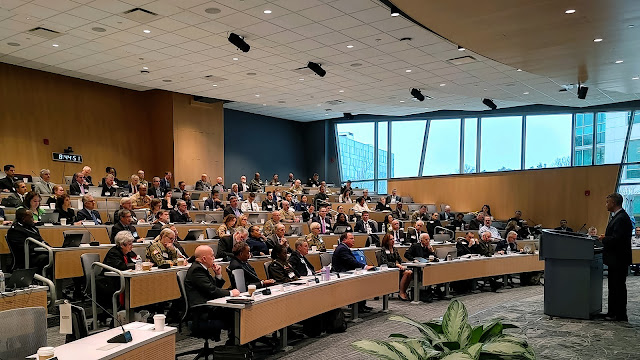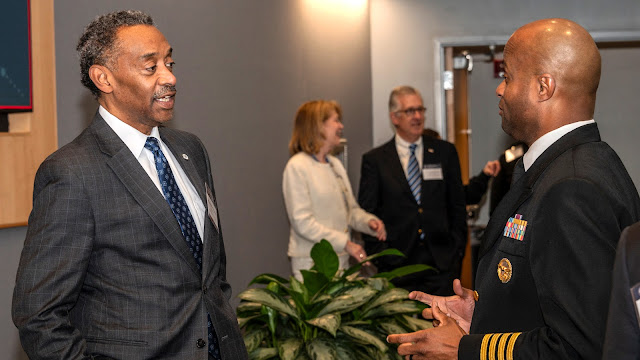Charting the Digital Frontier: MHS Convenes Inaugural Summit to Revolutionize Military Health
Leaders and experts in the Military Health System gathered to discuss and plan a digital health transformation strategy aimed at enhancing healthcare through technology and innovation during the first MHS digital health transformation summit, "Empowering the Future: The Military Health System's Digital Revolution," held on December 6-7, 2023.
December 14, 2023 by Sharon Holland
More than 160 attendees, including leaders from the Military Health System (MHS), Federal sector, academia and healthcare industry, gathered together Dec. 6-7, 2023, for the first MHS digital health transformation summit, “Empowering the Future: The Military Health System’s Digital Revolution.”
The event, planned by senior Uniformed Services University staff, was held to bring together digital transformation experts to share experiences and visions and to assist in developing an integrated MHS digital health transformation strategic plan.
The Honorable Ashish Vazirani, acting Under Secretary of Defense for Personnel and Readiness, kicked off the summit, telling attendees that delivery of care will require a revolution of technology to facilitate that care and that it required courage to advance into a digital future.
“As we move forward into this digital age, every member of the MHS – clinicians, nurses, lab technicians, researchers, support personnel, management, and so many others – must move out of our comfort zones to confront and embrace the opportunities and potential that this digital transformation offers us. We must be poised and eager to exploit success, particularly when there are breakthroughs that we may not have anticipated. We must also look beyond the DoD enterprise. We must engage and collaborate with other Federal entities and the private sector. Together, we are likely to develop a more complete solution. We must recognize and embrace failure, because there will be setbacks on this journey. Leaders at all levels must have the courage to acknowledge when something has gone wrong and to learn from these setbacks,” Vazirani said. “The only failure is if we do not take time to learn.”
His last point was that there must be commitment to moving forward with digital transformation and that the workforce must be appropriately trained.
“Digital transformation is all about creating enduring systems that support our strategic missions. These systems will not be created overnight. … We must be in this for the long haul and we must be committed to a learning mindset,” Vazirani said. “The critical driver of our success in harnessing and sustaining digital transformation will be education and training of our workforce, considering those who serve now and those who will follow. Our health professional education system must integrate and leverage the digital transformation system in what we teach and how we teach it. Military Health System clinicians must be digitally literate, comfortable with current and emerging technologies, persuasive health practitioners capable of engendering the trust and confidence of our diverse and dispersed patient population.”
The Honorable Lester Martinez-Lopez, Assistant Secretary of Defense for Health Affairs, told participants that advances in digital capabilities, artificial intelligence, machine learning and robot-aided treatment all have to be accelerated. “Our strategy begins by describing where we want to be at the close of our planning period,” he said. “As Yogi Berra would say, ‘if you don’t know where you’re going, you might end up someplace else.’ Our vision is this: by the end of the decade of 2020, the MHS will be a fully integrated health care system ready to deliver mission-centric, digitally-enabled, innovative and service-focused care in support of the nation’s military mission anytime, anywhere.”
Martinez-Lopez outlined his goals and objectives for the audience. He shared that his three strategic objectives include supporting the medically-ready force, supporting the ready medical force, and providing unparalleled healthcare delivery. He relayed that his four long-term goals are to “modernize the MHS, take a great leap forward in providing unequaled healthcare, take care of our people, and integrate evolving capabilities across the MHS.”
Defense Health Agency Director Army Lt. Gen. (Dr.) Telita Crosland told attendees, “I am not exaggerating when I say that there is not a more important topic for all of us in military medicine.
The breakthroughs happening in medical technology and in artificial intelligence are not just central to our responsibilities as medical professionals; they’re central to our responsibilities as national security professionals.”
USU President Dr. Jonathan Woodson started off his remarks by acknowledging the USU medical and graduate nursing students in attendance, and underscoring the importance of their participation in the summit.
“There was this great scenario from Saturday Night Live that came out in about the 2007 timeframe when the smartphone was coming on board, and the scenario was somebody fumbling with a phone or the computer and they looked around for their resident young person. We need to ensure that we have always at our side a resident young person who will think differently about these matters and may even quizzically look at us and say ‘why can’t you guys get this done?’”
Woodson discussed the importance of understanding that the nation was going through a fourth industrial revolution. “It’s just like the prior revolutions that fundamentally changed everything in terms of how we lived, worked, and played. And it will change healthcare,” he said. “The question is whether or not we do it thoughtfully or whether we are whipsawed by the changes that occur and, as a result, be devolved before we evolve.”
Woodson said that Martinez-Lopez recognized the vital role that digital transformation will play in the Military Health System, and tasked the MHS leadership last summer to develop a digital transformation strategy that would serve as the “polar star as we navigate our way through uncharted waters toward tomorrow.” Woodson emphasized the urgency of a well-developed strategy, stating,"To do nothing creates great risk. Doing something in an ad hoc, haphazard way creates even more risk."
The digital transformation strategy is projected to extend throughout the decade, adaptable to emerging global security challenges. Woodson stressed the importance of aligning the strategy with ongoing digital transformation efforts across the Department of Defense, the U.S. government, and private sector health and education systems.
The digital transformation strategy focuses on seven interrelated lines of effort, including digital health support, scalable and interoperable solutions, and the incorporation of artificial intelligence as a cornerstone of digital health. Woodson highlighted the need for workforce education and development, emphasizing that "the people are going to be what our credentials are in the health system."
This strategic initiative recognizes the Military Health System’s role in the U.S. and world health systems and aims to engage beneficiaries in a more value-added way, according to Woodson. "We must examine the perils and the promise of digital transformation in a clear-eyed way, as we work towards a future where unparalleled healthcare is provided anywhere in the world," Woodson concluded.
“As Dr. Martinez-Lopez emphasized, there is no turning back from these challenges and the opportunities that the digital and artificial intelligence revolution presents to us,” Woodson told meeting attendees. “Your job is to ask hard questions, to not let us get away with delivering platitudes but to examine deeply, because you’ll help us shape our future. And remember, we have a no fail mission to support this nation’s defense and the people we care for who go in harm’s way.”
The meeting also included several panel discussions and work groups over the two days to help shape the pathway for development of the digital health transformation strategy. Army Maj. Meredith Myatt was among the USU students who attended the event. Myatt highlighted the summit's value in promoting strategic transformation.
 |
The Digital Health Transformation summit sparked conversation amongst a wide variety of military medical leaders. (Photo credit: Tom Balfour, USU) |
“The summit provided a stage for policy practitioners, technology experts and military leaders to come together and discuss the strategic transformation needed to advance the Military Health System in an increasingly digital world. The expertise and diversity of the panel members was beyond comparison, and the conversations sparked during the breakout groups indicated a high level of commitment to the success of this mission,” said Army Maj. Meredith Myatt, a student in USU’s Daniel K. Inouye Graduate School of Nursing. “As students and future leaders in our field, we have the unique ability to make a larger impact by promoting the digital advances we learned are critical to improving care delivery and patient outcomes for all those entrusted to our care.”
At the conclusion of the Digital Health Transformation meeting, Crosland thanked Woodson and the USU team for setting up the event.
“That was an extraordinary lineup of speakers – informed, provocative, and helpful to all of us in the MHS. I was blown away by this day and a half! This summit accomplished exactly what we set out to do, and will help us inform a framework for how we craft our strategy.”




